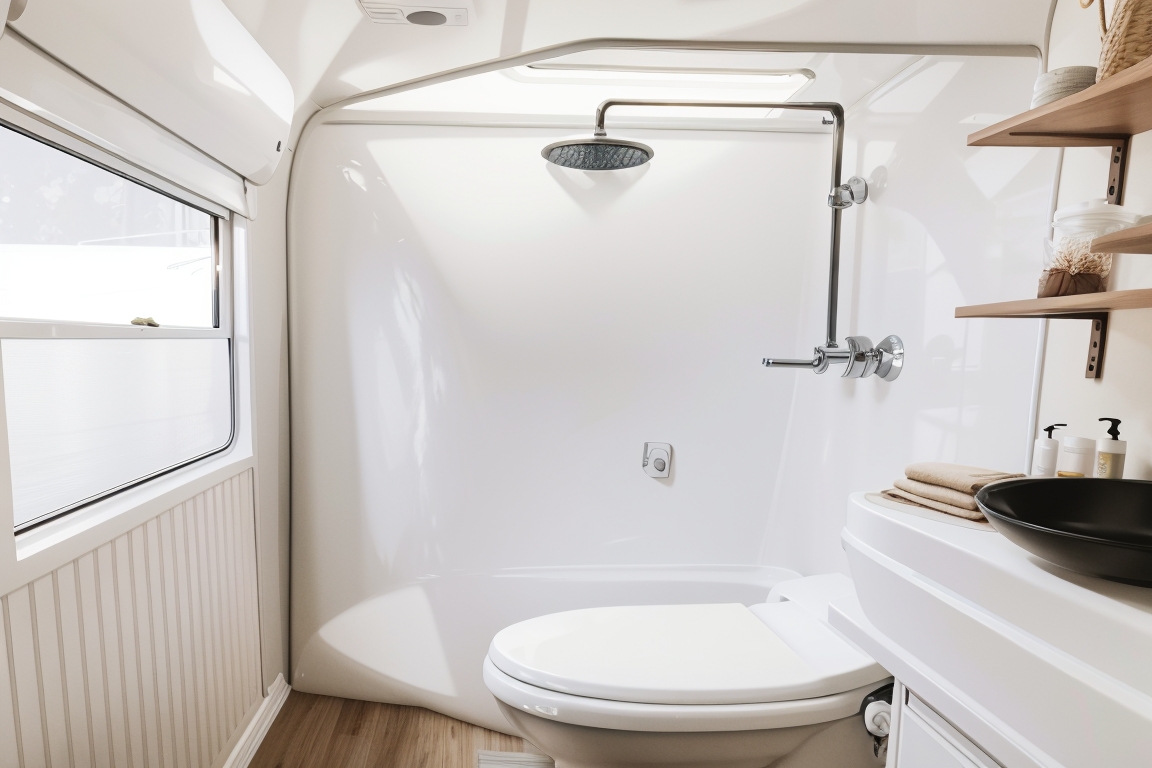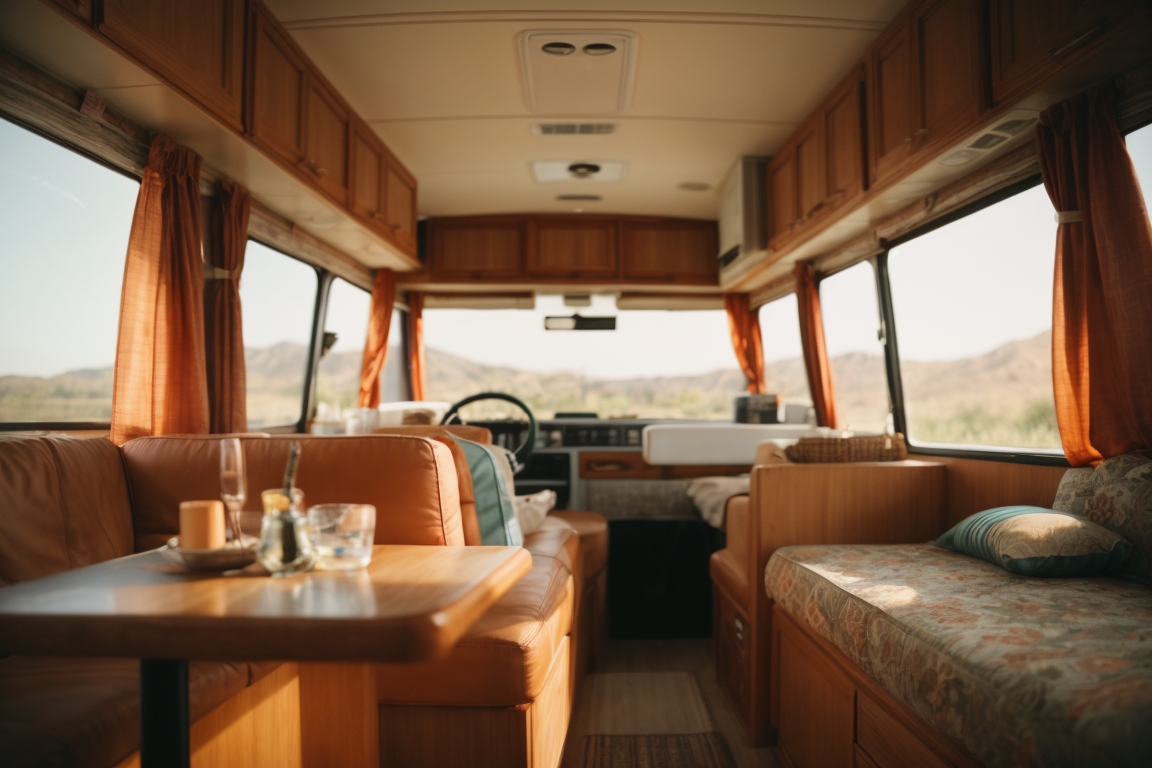
Types of Bathrooms Found in RVs: A Comprehensive Guide
cannon
- 0
Types of Bathrooms Found in RVs: A Comprehensive Guide
RVs or recreational vehicles are a popular choice for people who love to travel and explore the outdoors. These vehicles come in different sizes and types and are equipped with various amenities, including kitchens, living spaces, and bathrooms. Bathrooms in RVs are essential for comfort and convenience during long trips, especially when there are no public restrooms available.
There are different types of bathrooms found in RVs, and each type has its own advantages and disadvantages. One type is the wet bath, which is a compact bathroom that combines the toilet, shower, and sink in one space. Wet baths are commonly found in smaller RVs, such as Class B and some Class C motorhomes. Another type is the dry bath, which has a separate shower stall and toilet area. Dry baths are more spacious and offer more privacy, but they are usually found in larger RVs, such as Class A and some Class C motorhomes.
Standard RV Bathrooms
Standard RV bathrooms are the most common type of bathroom found in RVs. They are designed to be compact and efficient, while still providing all the necessary amenities for a comfortable bathroom experience.
The standard RV bathroom typically includes a toilet, sink, and shower. The toilet may be either a traditional flush toilet or a cassette toilet, which is a portable toilet that can be easily removed and emptied. The sink is usually small and may be combined with a vanity or storage cabinet. The shower is typically a stand-up shower that is enclosed with a shower curtain or door.
In terms of size, standard RV bathrooms can vary depending on the size of the RV. Generally, larger RVs will have larger bathrooms, while smaller RVs will have more compact bathrooms. However, even in larger RVs, the bathroom will still be smaller than a typical home bathroom.
One of the challenges of a standard RV bathroom is that it can be cramped and difficult to move around in. However, many RVers are willing to sacrifice some space for the convenience of having a bathroom on board.
Overall, standard RV bathrooms are a practical and functional option for RVers who want to have a bathroom on board without sacrificing too much space.
Wet Bathrooms in RVs
A wet bathroom is a type of bathroom found in RVs that combines the functionality of a sink, toilet, and shower in one space. The whole room can get wet, and there aren’t different areas for each one. Wet baths can be found in some Class C RVs, but they’re much more common in Class Bs and travel trailers. The smaller the RV, the more likely you’ll see a wet bath since even the smallest RVs can still fit a shower and toilet if they make use of a wet bath.
Wet bathrooms are a complete bathroom that takes up less space by combining the functionality of the toilet, sink, and shower. Every saved inch comes at a cost, and there are serious drawbacks to the system. For example, the entire bathroom can get wet, which can make it difficult to use the toilet or sink after someone has taken a shower.
However, wet baths are an excellent solution for those who want a full bathroom in a smaller RV. They take up less space than separate bathrooms, which can be a significant advantage for those who want to maximize their living space. Some RVers also prefer wet baths because they’re easier to clean than separate bathrooms.
Overall, wet bathrooms are a good choice for those who want a complete bathroom in a smaller RV and don’t mind the drawbacks. However, those who want more space or prefer a separate bathroom may want to consider other options.
Dry Bathrooms in RVs
Dry bathrooms, also known as full bathrooms, are a popular type of bathroom found in RVs. As the name suggests, dry bathrooms are designed to keep the shower and toilet areas separate, just like a residential bathroom. This means that the toilet area stays dry even when the shower is in use.
One of the main advantages of dry bathrooms is that they offer more privacy and comfort compared to wet bathrooms. Since the shower and toilet areas are separate, it is easier to use the bathroom without getting wet or feeling cramped. Dry bathrooms also tend to be larger than wet bathrooms, which means that there is more space to move around and store toiletries.
However, dry bathrooms also have some disadvantages. They require more space and plumbing than wet bathrooms, which means that they are not as common in smaller RVs. Dry bathrooms may also be more expensive to install and maintain, especially if they have features like a bathtub or a separate sink area.
Overall, dry bathrooms are a great option for RVers who value privacy and comfort. They are especially popular in larger RVs like Class A motorhomes and fifth wheels, where space is not as much of a concern.
Half Bathrooms in RVs
A half bathroom, also known as a powder room or guest bathroom, typically includes a toilet and a sink. It is called a “half” bathroom because it lacks a shower or bathtub. Half bathrooms are a common feature in many RVs, particularly in larger models.
One of the main advantages of having a half bathroom in an RV is that it provides an additional space for guests to use the restroom without having to go through the main bedroom. This can be especially useful when traveling with a group of people or hosting guests.
Another benefit of having a half bathroom in an RV is that it can help to reduce the amount of time spent waiting for the main bathroom to become available. This can be particularly important when traveling with a family or a group of people who all need to use the restroom at the same time.
When it comes to cleaning and maintenance, a half bathroom can be much easier to maintain than a full bathroom. With fewer fixtures and surfaces to clean, it can be quicker and more convenient to keep a half bathroom clean and tidy.
Overall, a half bathroom can be a useful addition to an RV, providing additional convenience and functionality for travelers on the road.
Full Bathrooms in RVs
Full bathrooms in RVs are designed to provide all the amenities of a traditional bathroom in a compact space. These bathrooms typically include a shower, toilet, and sink, and are found in larger RVs such as Class A and Class C motorhomes, fifth wheels, and travel trailers.
The shower in a full bathroom may be a separate enclosure or may be combined with the toilet and sink in a wet bath design. Wet baths are more common in smaller RVs where space is limited. In a wet bath, the entire bathroom is designed to get wet, and the toilet and sink are often integrated into the shower area.
Full bathrooms in RVs may also include features such as a medicine cabinet, storage cabinets, and a ventilation fan. Some RVs may also have a bathtub in addition to a shower.
When it comes to plumbing, full bathrooms in RVs operate similarly to traditional bathrooms. They have a holding tank for waste water and a fresh water tank for supplying water to the sink, toilet, and shower. It is important to use RV-specific toilet paper and avoid flushing anything that could clog the pipes.
Overall, full bathrooms in RVs provide a convenient and comfortable way to enjoy the comforts of home while on the road.
Ensuite Bathrooms in RVs
Ensuite bathrooms are becoming increasingly popular in RVs, especially in larger models. An ensuite bathroom is a private bathroom that is directly attached to the bedroom, providing the ultimate convenience and privacy for the occupants.
These bathrooms are typically found in Class A and Class C RVs, as well as luxury fifth-wheel trailers. They often feature a full-size shower, toilet, and sink, as well as plenty of storage space for toiletries and towels.
One of the main advantages of an ensuite bathroom is that it allows for easy access to the facilities without having to leave the bedroom. This can be particularly beneficial during the night or early morning when occupants may not want to disturb others in the RV.
However, it’s worth noting that ensuite bathrooms can take up valuable space in an RV, which may be a concern for those with smaller models. They may also require additional plumbing and electrical work, which can add to the cost of the RV.
Overall, an ensuite bathroom can be a great addition to an RV, providing added comfort and convenience for the occupants. However, it’s important to carefully consider the space and cost implications before deciding whether to include one in your RV.
Outdoor RV Bathrooms
Outdoor RV bathrooms, also known as “wet baths,” are a type of bathroom that combines the shower, toilet, and sink in one small space. These bathrooms are typically found in smaller RVs, such as Class B motorhomes and camper vans, where space is at a premium.
In an outdoor RV bathroom, the entire space is waterproofed to prevent water damage. The shower head is typically mounted on the wall, and a curtain or door separates the shower area from the rest of the bathroom. The toilet is often a cassette toilet that can be easily removed and emptied, while the sink is usually a small basin that can be folded away when not in use.
While outdoor RV bathrooms may not be as spacious or luxurious as other types of RV bathrooms, they are a convenient and practical solution for those who want to have a bathroom on board without sacrificing too much living space. They are also easy to clean and maintain, as all the surfaces are waterproof and can be wiped down with a damp cloth.
One thing to keep in mind when using an outdoor RV bathroom is that the entire space can get wet when you take a shower, so it’s important to keep your towels and clothes in a dry area. You may also need to squeegee the walls and floor to prevent mold and mildew from forming.
Overall, outdoor RV bathrooms are a great option for those who want a compact and functional bathroom on board their RV. While they may not be as luxurious as other types of bathrooms, they are a practical and convenient solution for those who want to enjoy the great outdoors without sacrificing too much comfort.
Customized RV Bathrooms
Some RV owners choose to customize their bathrooms to suit their specific needs and preferences. This can involve anything from upgrading the fixtures to completely renovating the space. Here are a few examples of customized RV bathrooms:
- Spa-like Bathrooms: Some RVers choose to create a spa-like atmosphere in their bathrooms by adding luxury features such as a rainfall showerhead, heated floors, and a towel warmer. They may also opt for high-end finishes such as marble countertops and brushed nickel fixtures.
- Accessible Bathrooms: For RVers with mobility issues, an accessible bathroom can make all the difference. This may involve adding grab bars and a shower seat, as well as widening the door to accommodate a wheelchair.
- Pet-Friendly Bathrooms: RVers who travel with pets may choose to customize their bathrooms to make them more pet-friendly. This can involve adding a pet shower or bathtub, as well as storage for pet supplies.
- Family-Friendly Bathrooms: Families with young children may opt for a bathroom with a bathtub instead of just a shower. They may also add extra storage for toys and other kid-friendly items.
Customizing an RV bathroom can be a great way to make the space more functional and enjoyable. However, it’s important to keep in mind that major renovations can be costly and time-consuming. RVers should carefully consider their needs and budget before embarking on a bathroom renovation project.
Choosing the Right RV Bathroom Type
When it comes to choosing the right bathroom type for your RV, there are a few factors to consider. These include the size of your RV, the number of people who will be using the bathroom, and your personal preferences.
Types of RV Bathrooms
There are two main types of RV bathrooms: wet baths and dry baths. Wet baths are essentially a combined shower and toilet area, while dry baths have a separate shower and toilet area.
Wet Baths
Wet baths are typically found in smaller RVs, such as Class B and Class C motorhomes. They are designed to save space and are often more affordable than dry baths. However, they can be difficult to use, as everything in the bathroom gets wet when you take a shower.
Dry Baths
Dry baths are more common in larger RVs, such as Class A motorhomes and fifth wheels. They offer more space and privacy than wet baths, as the shower and toilet are separate. Dry baths can be more expensive than wet baths, but they are generally more comfortable and easier to use.
Other Factors to Consider
In addition to the type of bathroom, there are a few other factors to consider when choosing an RV bathroom. These include:
- Toilet Type: There are several types of RV toilets, including cassette toilets, composting toilets, and gravity flush toilets. Each type has its own pros and cons, so it’s important to choose the one that best fits your needs.
- Water Tanks: Your RV will have at least two water tanks: one for fresh water and one for gray water. Some RVs also have a black water tank for waste and sewage. Make sure you choose an RV with tanks that are large enough for your needs.
- Ventilation: Proper ventilation is important in an RV bathroom to prevent moisture buildup and odors. Look for an RV with a vent fan or window in the bathroom.
- Storage: RV bathrooms are often small, so it’s important to choose an RV with plenty of storage space for toiletries and other bathroom essentials.
By considering these factors and choosing the right type of bathroom for your needs, you can ensure that you have a comfortable and functional bathroom in your RV.
Related
Post Disclaimer
The information contained in this post is for general information purposes only. The information is provided by me and while we endeavor to keep the information up to date and correct, we make no representations or warranties of any kind, express or implied, about the completeness, accuracy, reliability, suitability or availability with respect to the website or the information, products, services, or related graphics contained on the post for any purpose.

